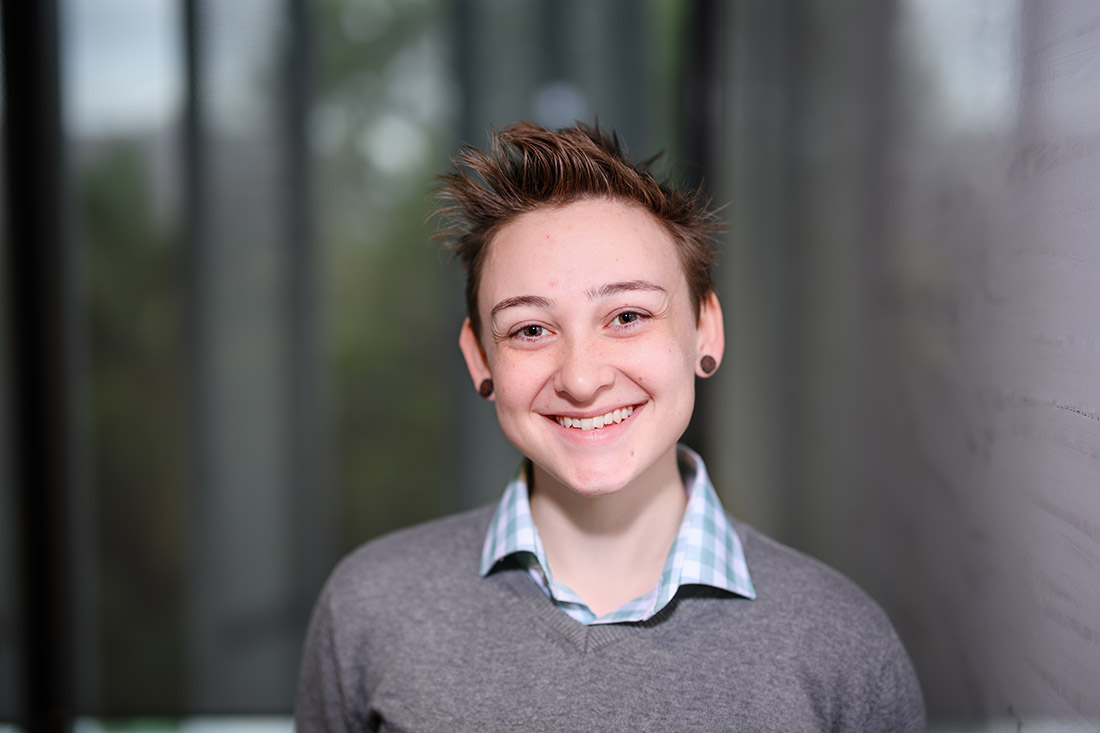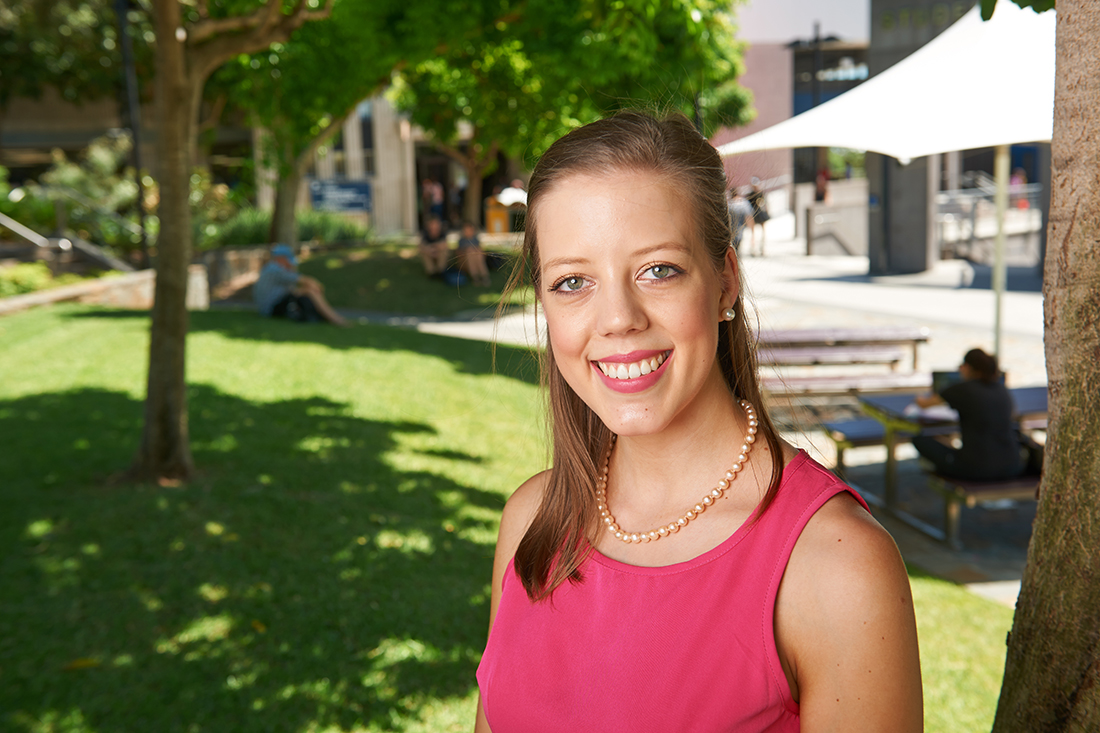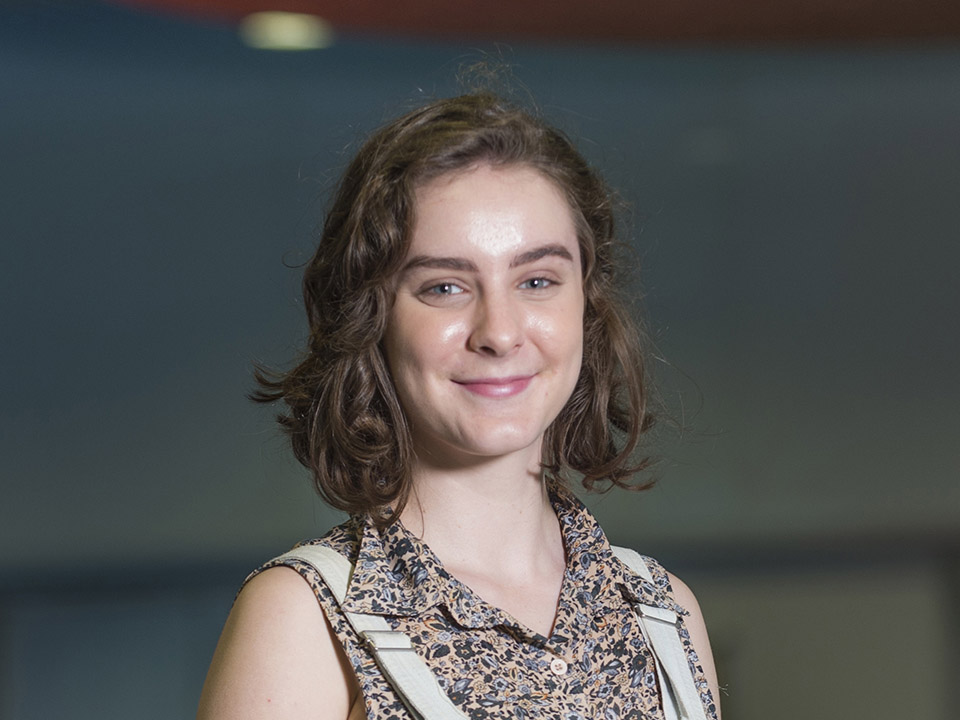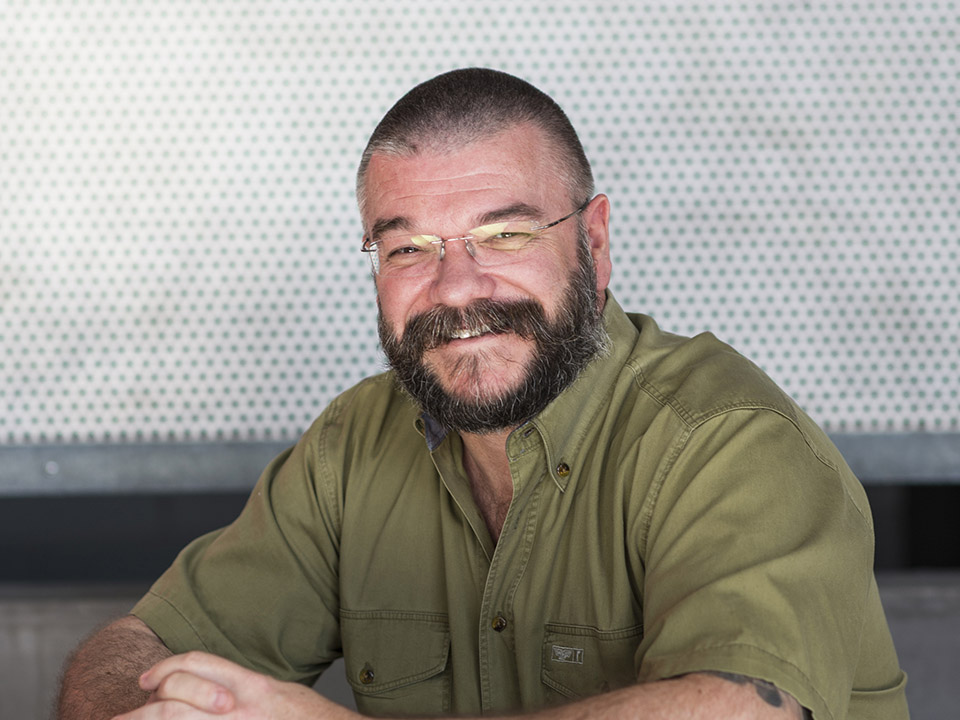A degree that makes a difference
'Public health graduates can work in many spheres, whether it's in hospitals, in economics, or in policy. I view the role of a public health professional as someone who empowers communities to use their own voices and to take initiative.
If you're someone who is passionate about social justice, equality and creating a better world, I would strongly recommend public health.'
Work that makes a difference
'As a policy officer with the Queensland Department of Health I work to improve the wellbeing of all Queenslanders. I contributed to the Queensland Health COVID-19 Action Plan for multicultural communities. I also developed strategic policy plans to improve the delivery of COVID-19 messages, directions and vaccine rollout strategy to meet the needs of multicultural Queenslanders. I enjoy my current role as it always presents me with new challenges that keep me interested and learning.'
Study public health at QUT
Hear from current student Georgia Hawkins why studying public health at QUT can set you up for a great career.
Collaboration is key
The most beneficial thing about QUT’s public health degree is the focus on developing both the hard and soft skills of a public health professional. Many of the assessments combine theory with actual projects that you could be working on in real life. During my practicum, I worked within a multidisciplinary clinic focused on improving the health of Aboriginal and Torres Strait Islander peoples. My project involved collaborating with the community, general practitioners, nurses and allied health workers to create a patient resource for the treatment of a common communicable disease. It was very gratifying to bring people together and contribute something of use within a health setting.
International opportunities
‘I was always interested in pursuing a career in international aid and development, and with help from QUT staff I was able to complete my final-year placement in Vietnam. After graduation, I was offered an internship with the World Health Organisation (WHO). After studying and learning about the types of issues that the WHO focuses on, it felt surreal to actually be interning with them.’
Explore real world issues
'I chose to study a Bachelor of Public Health because I am interested in serving in an international organisation like the World Health Organisation (WHO) or the United Nations. I enjoy group work and presentations in my classes as it allows me to interact with other students. QUT has a diverse group of international students, which is an added advantage for my ambitions and enriches my study experience. We explore real world issues like gender inequality, life threatening diseases and lifestyle choices that have a huge impact on our world. I was blown away by the insights I received from my lecturer, especially the week we were briefed by the Australian Bureau of Statistics and Cancer Council Queensland.'
Bachelor of Public Health
Work that makes a difference
'As a policy officer with the Queensland Department of Health I work to improve the wellbeing of all Queenslanders. I contributed to the Queensland Health COVID-19 Action Plan for multicultural communities. I also developed strategic policy plans to improve the delivery of COVID-19 messages, directions and vaccine rollout strategy to meet the needs of multicultural Queenslanders. I enjoy my current role as it always presents me with new challenges that keep me interested and learning.'
Collaboration is key
The most beneficial thing about QUT’s public health degree is the focus on developing both the hard and soft skills of a public health professional. Many of the assessments combine theory with actual projects that you could be working on in real life. During my practicum, I worked within a multidisciplinary clinic focused on improving the health of Aboriginal and Torres Strait Islander peoples. My project involved collaborating with the community, general practitioners, nurses and allied health workers to create a patient resource for the treatment of a common communicable disease. It was very gratifying to bring people together and contribute something of use within a health setting.
International opportunities
‘I was always interested in pursuing a career in international aid and development, and with help from QUT staff I was able to complete my final-year placement in Vietnam. After graduation, I was offered an internship with the World Health Organisation (WHO). After studying and learning about the types of issues that the WHO focuses on, it felt surreal to actually be interning with them.’
A degree that makes a difference
'Public health graduates can work in many spheres, whether it's in hospitals, in economics, or in policy. I view the role of a public health professional as someone who empowers communities to use their own voices and to take initiative.
If you're someone who is passionate about social justice, equality and creating a better world, I would strongly recommend public health.'










Highlights
- Choose an elective area of study such as community nutrition, Indigenous health, family and gender issues, health management, and general studies in psychology.
- Complete 185 hours of professional placements, both in Australia and overseas, to gain real experience and industry contacts.
- Prepare yourself for a career in health education and promotion, policy development, epidemiology, risk management and disease prevention.
Highlights
- Choose an elective area of study such as community nutrition, Indigenous health, family and gender issues, health management, and general studies in psychology.
- Complete 185 hours of professional placements, both in Australia and overseas, to gain real experience and industry contacts.
- Prepare yourself for a career in health education and promotion, policy development, epidemiology, risk management and disease prevention.
Why choose this course?
This course offers the flexibility to concentrate your studies in areas that align with career opportunities. You will choose five elective units from areas that include community nutrition, Indigenous health, family and gender issues, health management and general studies in psychology. You can also tailor the program with further study for a career as a registered environmental health officer or occupational health and safety officer.
An understanding of the biological, social, cultural, economic and physical factors that underpin the health of a community can be applied to many health disciplines. You will be taught by professionals with backgrounds in medicine, nursing, research, policy development and health service management. Our graduates are strategic thinkers who can apply their knowledge to develop innovative solutions that create improved health and quality of life for everyone.
Real-world learning
During this course, you will complete 185 hours of professional placement. This provides an opportunity for you to work alongside industry professionals and contribute to real projects. These may be completed in metropolitan and regional areas in Queensland, or overseas. Recently, our students have been placed with government agencies, non-government organisations such as Cancer Council Queensland and the Heart Foundation, community and advocacy groups, and internationally with our partners in Vietnam, Cambodia, and India.
Explore this course
Public health professionals develop and deliver health initiatives that focus on improving the health and wellbeing of whole populations, locally and on a global scale. They may specialise in preventing the spread of disease, promoting health services, developing policies and practices that deliver fair and equitable health systems, creating safer work environments, investigating sustainable environmental practices, advocating for minority groups, or encouraging communities to adopt healthy lifestyle choices.
Double degrees
Combine two bachelor degrees into a single course of study. A double degree allows you to specialise in two fields and pursue different interest areas, gaining a broader range of skills and knowledge, and giving you a competitive advantage and greater career flexibility.
Consider the following double degrees with a Bachelor of Public Health:
- Nursing: develop your nursing career in clinical environments or non-clinical roles with a focus on public health areas such as Indigenous health, community health, risk factors for illness, or implementing new policies and programs to improve population health.
- Human Services: develop and deliver support programs in government health and human services departments, non-government organisations, community and advocacy groups, and not-for-profit organisations.
Work Integrated Learning
During this course you will be required to completed 185 hours of professional work placement.
Careers and outcomes
Many graduates work in local, state or national health departments. Their role may focus on health education and promotion, policy development, epidemiology, risk management and disease prevention. Graduates may also work in nongovernment and community organisations, as project officers in international health agencies, or even become social entrepreneurs.
By completing further study such as a graduate diploma or masters degree, you can specialise in disease control; health promotion; health, safety and the environment; or health management.
Professional recognition
Graduates are eligible for membership of the Public Health Association of Australia, the Australian Health Promotion Association and the International Union for Health Promotion and Education.
Possible careers
- Administrator
- Community health officer
- Community worker
- Epidemiologist
- Government officer
- Health educator
- Health promotion officer
- Home economist
- Information officer
- Manager
- Policy officer
- Project manager
- Public health officer
- Public health program manager
- Research assistant
- ATAR/selection rank threshold
- 70.00
These thresholds are the lowest adjusted scores to which QUT made an offer in Semester 1, 2024.
Don't have a ATAR/selection rank?
- Course code
- PU52
- QTAC code
- 425372
- CRICOS code
- 077691J
-
- Online
- Kelvin Grove
-
- Kelvin Grove
- 3 years full-time
- 6 years part-time
- 3 years full-time
- February and July
- February and July
Assumed knowledge
Before you start this course, we assume you have sound knowledge of the subject/s listed below. If you don't have the subject knowledge, you can still apply for the course but we strongly encourage you to undertake bridging studies to gain the knowledge:
- English, or Literature, or English and Literature Extension, or English as an Additional Language (Units 3 & 4, C)
Year 12 early offer scheme
If you're a current Queensland Year 12 student, you may be eligible to receive an offer for this course on the last day of Queensland Year 12, before receiving your ATAR or selection rank.
Offer guarantee
If you achieve an ATAR or selection rank of 70.00 or higher (including any adjustments) and satisfy all other admission requirements, you are guaranteed an offer for this course.
VET guarantee
If you have completed an AQF certificate IV, diploma or higher, and satisfy all other admission requirements, you are guaranteed an offer for this course.
Advanced standing
If you have prior studies or work experience, you may be eligible for advanced standing (credit). You can apply for advanced standing once you've been accepted to QUT. If you're in your first semester of study, you must apply for advanced standing within 10 days of receiving your offer.
Deferment
You can defer your offer and postpone the start of your course for one year.
More about deferring your offer
Adjustments to your ATAR/selection rank
Any adjustments you receive to your ATAR or selection rank will be applied to this course.
Find out if you’re eligible for an adjustment to your ATAR or selection rank
Offers we made to school leavers in Semester 1, 2024
The figures listed in the tables below reflect the offers that were made to recent ATAR students. The entry thresholds box at the top of this page shows the lowest adjusted ATAR/selection rank required to receive an offer for all applicants for the most recent January QTAC offer round.
| Excluding adjustments | Including adjustments | |
|---|---|---|
| Highest ATAR/selection rank to receive an offer |
Selection rank
87.00
|
Selection rank
91.00
|
| Median ATAR/selection rank to receive an offer |
Selection rank
77.95
|
Selection rank
80.95
|
| Lowest ATAR/selection rank to receive an offer |
Selection rank
68.65
|
Selection rank
73.85
|
You can find out more about your fellow students’ backgrounds with this course’s student profile.
Other admission options
If you are of Aboriginal or Torres Strait Islander descent, you may be eligible for admission through our Centralised Assessment Selection Process (CASP).
Select the country where you completed your studies to see a guide to the grades you need to apply for this course.
If your country or qualification is not listed, you can still apply for this course and we will assess your eligibility.
I completed secondary school in Australia
- ATAR/selection rank
- 70.00
Offer guarantee
If you completed secondary school in Australia and achieve an ATAR/selection rank of 70.00 or higher (including any adjustments) and satisfy all other admission requirements, you are guaranteed an offer for this course.
VET guarantee
If you have completed an AQF certificate IV, diploma or higher, and satisfy all other admission requirements, you are guaranteed an offer for this course.
Minimum English language requirements
Select the country where you completed your studies to see a guide on meeting QUT’s English language requirements.
Your scores and prior qualifications in English-speaking countries are considered. Approved English-speaking countries are Australia, Canada, England, Ireland, New Zealand, Scotland, United States of America and Wales.
If your country or qualification is not listed, you can still apply for this course and we will assess your eligibility.
We accept English language proficiency scores from the following tests undertaken in a secure test centre. Tests must be taken no more than 2 years prior to the QUT course commencement.
| English Test | Overall | Listening | Reading | Writing | Speaking |
|---|---|---|---|---|---|
| IELTS Academic / One Skill Retake | 6.5 | 6 | 6 | 6 | 6 |
|
Cambridge English Score
You must share your results with QUT through the Candidate Results Online website. |
176 | 169 | 169 | 169 | 169 |
| PTE Academic | 58 | 50 | 50 | 50 | 50 |
| TOEFL iBT | 79 | 16 | 16 | 21 | 18 |
Don't have the English language score you need? We can help!
We offer English language programs to improve your English and help you gain entry to this course.
When you apply for this course, we will recommend which English course you should enrol in.
Course requirements
There are requirements that you will need to meet as a student in this course. You will need to identify these requirements and ensure you allow sufficient time to meet them. Some of these requirements have associated costs.
Blue card: You must undergo a criminal history check for working with children and be issued with a suitability card (blue card) before commencing clinical placement/practicum in an organisation where they may work with children or young people.
The processing of your application may take several months so you must submit your blue card application to HiQ as early as possible to ensure you have your card before you begin any unit that requires contact with children. There is no charge for student blue cards. Students who already have a blue card must register it with QUT.
Information is available from the Additional course requirements and costs webpage.
Your actual fees may vary depending on which units you choose. We review fees annually, and they may be subject to increases.
2025 fees
2025: CSP $12,300 per year full-time (96 credit points)
Additional Costs
There are requirements that you will need to meet as a student in this course. Some of these requirements have associated costs. Information is available from the Additional course requirements and costs website.
2025 fees
2025: $39,100 per year full-time (96 credit points)
Additional Costs
There are requirements that you will need to meet as a student in this course. Some of these requirements have associated costs. Information is available from the Additional course requirements and costs website.
2024 fees
2024: CSP $12,200 per year full-time (96 credit points)
Additional Costs
There are requirements that you will need to meet as a student in this course. Some of these requirements have associated costs. Information is available from the Additional course requirements and costs website.
2024 fees
2024: $36,900 per year full-time (96 credit points)
Additional Costs
There are requirements that you will need to meet as a student in this course. Some of these requirements have associated costs. Information is available from the Additional course requirements and costs website.
Student services and amenities fees
You may need to pay student services and amenities (SA) fees as part of your course costs.
HECS-HELP: loans to help you pay for your course fees
You may not have to pay anything upfront if you're eligible for a HECS-HELP loan.
You can apply for scholarships to help you with study and living costs.
QUT Excellence Scholarship (Academic)
QUT's premier offering for students with outstanding academic achievement.
- Scholarship eligibility
- Academic performance
Equity scholarships scheme
A scholarship for low-income students studying in any faculty.
- Scholarship eligibility
- Struggling financially
QUT Elite Sport Scholarship
QUT's premier offering for students with outstanding sporting achievement.
- Scholarship eligibility
- Sporting excellence
International Merit Scholarship
A high achievement scholarship for future international undergraduate and postgraduate students.
- Scholarship eligibility
- Academic performance
QUT Budding Entrepreneur Scholarship
A scholarship for innovative individuals who are engaged in their passion for entrepreneurial action.
- Scholarship eligibility
Keep up to date
QUT courses for you
Like to save your courses?
Please enter your first name and email so we can save your courses for you



